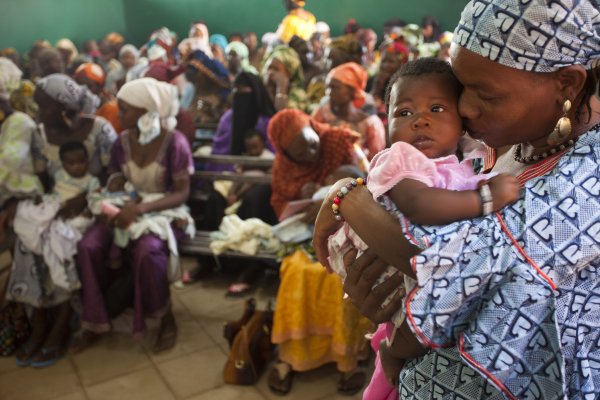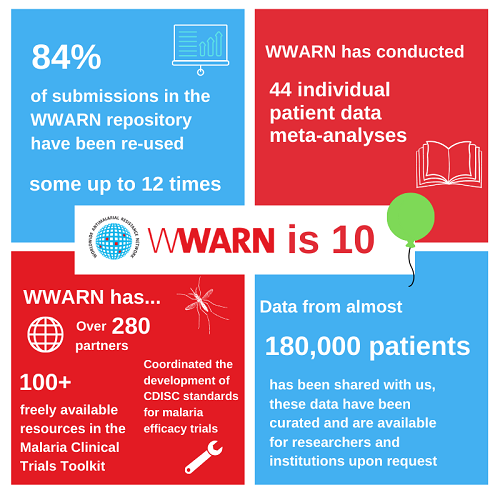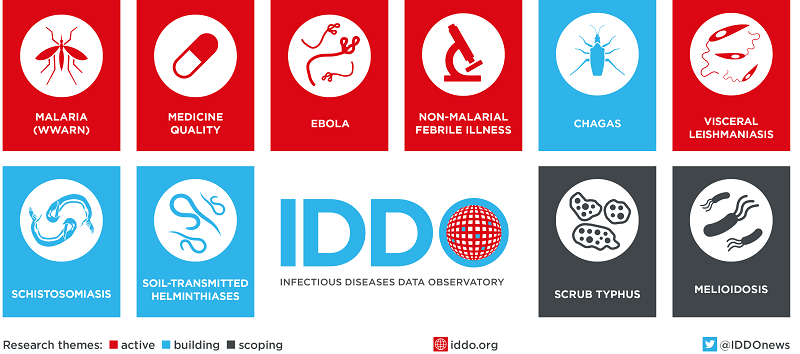WWARN celebrates 10th Anniversary
This year we mark a decade of WWARN. As a unique collaborative data-sharing framework, over the last ten years WWARN has proved it is possible to produce policy-changing scientific evidence about the treatment of malaria from the collection, curation and further analysis of existing data.

WWARN launched in 2009 during a time when malaria treatment was at a crossroads – artemisinin combination therapies (ACTs), the gold standard for P. falciparum treatment, were being scaled up for a disease that threatened half the world's population, yet simultaneously, the first signs of artemisinin resistance were emerging in South East Asia.

An incomplete understanding of this propelled the world's leading researchers, physicians, and epidemiologists to unite their efforts to collect real-time information on antimalarial resistance. A multidisciplinary team of scientists and policy makers developed WWARN's initial objectives and set out to create a global database to track and understand this alarming trend.
WWARN's international partnerships played an essential role in supporting the drive to fight malaria, then and now, and its collaborative approach focused on putting researchers in the regions most at risk at the centre of the work.
In those early days, sharing data was not common within the malaria community. Although many scientists recognised its potential for global surveillance of antimalarial resistance – it was difficult to convince the wider community of its value. Nonetheless, clear governance rules about the structures for data sharing were put in place, including an ethical, technical and legal framework to provide a foundation for the new endeavour.
The study group model
Progress accelerated with WWARN's focus on concrete research questions. It developed the study group model to answer questions it would not be possible to answer using a single-study or small amounts of aggregated data. In this approach, contributors of relevant datasets are invited to help define the question to be addressed, join the study group, contribute data for secondary analyses, and co-author the resulting publication(s). The Individual Patient Data files (IPD) from many regions and time-periods can then be harmonised and analysed as a single dataset, increasing the statistical power needed to address knowledge gaps in malaria research.
Regional centres and resources for the malaria community
From early 2010, WWARN established regional centres to build skills and capacity and encourage participation of scientists from endemic regions. To support these researchers, and respond to the growing demand to collate and standardise clinical trial data, WWARN developed guidelines and tools for conducting trials according to international standards.
Dr Elizabeth Allen co-led with members of the research community the development of the malaria clinical trials toolkit and commented: "The Toolkit is an open- and easy-access platform of practical resources to support antimalarial trial conduct. With something for everyone in the trial team, the laboratory, operational, data management and analytical tools should enhance efficiencies and facilitate the secondary use of quality trial data".
Standardising, storing and sharing data
Standardising the enormous breadth of malaria clinical data has been crucial to ensure data are harmonised, comparable and ready for sharing and further analyses. WWARN facilitated the development of the first malaria CDISC standard – a common set of rules by which data can be acquired, shared and re-used in a standardised way. WWARN has been able to link together different types of data such as pharmacokinetic and molecular data with clinical treatment responses. This facilitates the assessment of the clinical significance of changes in patient response to antimalarial drug treatment, for example. This kind of assessment on a large scale has been essential for informing policy and practice.
WWARN has worked hard to ensure that data sharing is equitable, impactful, and that existing data are used to their full potential. The repository now contains most of the world's data on the efficacy of treatment of patients with antimalarial drugs that is accessible on request for researchers to analyse and conduct their own secondary analyses.
The launch of IDDO
Today the importance of data sharing is widely reflected in research and practice. Data sharing is now a prerequisite for many funders and scientific journals, and is supported by the WHO and regulatory agencies. At the request of health communities working on specific infectious diseases, the WWARN model has been expanded beyond malaria and in 2016 the Infectious Diseases Data Observatory (IDDO) was launched. Data platforms have been developed for emerging and poverty-related infectious diseases.

Looking ahead
Between 2010 to 2017 there were 20 million fewer cases of malaria, however progress appears to have stalled, as since 2015 there has been no significant global reduction in malaria. The continued emergence of parasite resistance to antimalarial drugs remains a huge problem, as well as concerns regarding funding commitments in countries with the highest disease burden, since they are being asked to allocate more resources towards numerous public health priorities.
However, many countries are now moving towards zero cases of malaria, and elimination in large endemic regions may now be a realistic goal. To achieve this, further and sustained investment in new tools and approaches to fight against malaria are paramount.
"In the coming years, WWARN will continue to produce high-quality science to drive forward progress in the key knowledge gaps facing malaria elimination. Increasingly, WWARN will focus on assembling data on effectiveness in addition to efficacy data, in order to better understand the impact of current strategies in real-life implementation, in particular, preventive interventions. We will enrich the WWARN inventory to maximise use of existing data and make it readily available for further analysis by researchers all over the world." said Professor Philippe Guérin, Director of WWARN.

